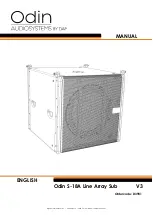
7
5SERgS-ANUAL
passive network with a
fi
xed crossover
frequency of 70 Hz and a 6 dB per
octave slope.
We rec om mend using this high-pass
function with main/satellite speak ers
that are small and not designed to
reproduce low fre quen cies. If your main
speakers are capable of op er at ing full
range, then you will not need to use the
high-pass function.
To use the high-pass outputs, connect
the preamp outs on your preamp/
receiver to the subwoofer’s line level in-
puts using good quality RCA type patch
cords. Then connect a second patch
cord from the subwoofer’s outputs to
the inputs of your main ampli
fi
er. This
will allow your main speak ers to oper-
ate at fre quen cies above 70 Hz and the
sub woof er to operate at fre quen cies
below 70 Hz (see page 16).
6. Line Level Inputs
Connect these unbalanced inputs with
RCA type patch cords to the line level
outputs of your receiver or preamp.
If your preampli
fi
er or receiver has a
single sub/LFE output, connect it to
the sub woof er’s left input jack (see
page 14). There is no need to use the
subwoofer’s right input jack.
If you want to run your main/satellite
speakers full range, use a “Y” adapter
at the preampli
fi
er outputs (see page
15). In this way, you can send the
preampli
fi
er’s output signal to your
main ampli
fi
er and to the subwoofer at
the same time.
7. Balanced (XLR) Input
Use this balanced input to connect
to the balanced line-level output of a
Home Theater preampli
fi
er or other
source. Balanced connections offer
superior noise cancellation over unbal-
anced connections, so if your preamp
has an XLR subwoofer output, we
recommend using it.
8. Speaker Level Inputs
Under normal conditions, the preferred
connection is through the line level
inputs. If this is dif
fi
cult or not possible
in your system, then you can use the
speaker level inputs. Also, if you ex pe -
ri ence ex ces sive noise or hum with the
line level inputs, often a simple change
to the speaker level inputs will result in
a lower back ground noise level.
Connect the speaker level inputs to the
speak er-level outputs of your am pli
fi
er
or receiver using speaker wire. The
binding posts can accept bare wire,
banana, dual-banana or spade con-
nec tions.
Your ampli
fi
er or receiver MUST
have com mon grounded outputs,
or it will be dam aged if con nect ed
to the subwoofer’s speaker level
inputs.
9. Line Fuse
The subwoofer is supplied with a con-
ser va tive
slow-blow type fuse to protect
the elec tron ics.
Always unplug the power cord
before inspecting or changing the
fuse. Never use a fuse with a larg-
er current rating than shown on the
markings next to the fuseholder.
10. IEC Linecord socket
The subwoofer comes with a detach-
able linecord which connects here.
US (120 VAC) MODEL: Connect
the linecord to the subwoofer before
connecting the other end to an 120
Volt, 60 Hz AC outlet. The outlet must
have a cir cuit rating of 8 amps or more
(a typical home circuit is rated at 15
amps).
Never plug the US (120 VAC)
Model subwoofer directly into
220-240 Volts AC as this will cause
cat a stroph ic circuit failure.








































